A few weeks ago, I launched an informal survey to ask people what they thought of PPC search advertising, hoping to peel back a bit more of the curtain of their sentiments and beliefs. As promised, I’m happy to share the results with you.
Well, maybe “happy” isn’t the right word.
As you’ll see, the feedback about search advertising is not particularly positive — although on the bright side, it does leave considerable room for improvement.
I segmented respondents into two groups, those who work in marketing (the orange bars in the charts below) and those who don’t (the blue bars). This was an important distinction, as marketers tended to have a very different perspective on this subject — not surprisingly, a more positive one — than everyone else.
Right away we see a big split: 33% of marketers said they frequently pay attention to the ads when searching on Google, Yahoo! or Bing. In contrast, only 4.5% of non-marketers claimed such frequency; instead, 68.2% of them responded that they never or rarely do so.
So perhaps marketers have a “professional interest” in the ads — but most everyone else is trying to not pay attention to them. I can’t say I’m surprised by these results, as the popular sentiment against advertising is no secret. But I am disappointed that search ads — theoretically, a great mechanism to efficiently match people and providers — may be failing to connect with searchers in most situations.
Along those lines, I asked respondents if there were circumstances where they were more inclined to pay attention to the ads. For non-marketers, 63.6% reported increased attention when looking to buy something specific, which I interpret as relatively late in the buying cycle. Only 22.7% focus more on the ads when learning about a new idea or concept; and a mere 18.2% do so when trying to find answers to a problem. I believe you could interpret those situations as the earliest moments in potential buying cycles, where formative opinions are being shaped — yet here’s where people seem to be least inclined to consider signals from advertisers.
Curious about the rationale behind this avoidance bias, I asked people for the reasons why they avoid the ads on a particular search. Just focusing on non-marketers, the top responses were (1) don’t want to buy anything, (2) don’t think advertisers will have anything useful for me — that one raises some concern — and (3) don’t find the information in the ads to be helpful. (How helpful can 135 characters of a text ad be? Can we do better?)
But the big alarm was that 40.9% of non-marketers said that they don’t trust the advertisers. Which is apparently a well-founded suspicion, because 47.9% of the marketers answered the same!?! This is a core issue. If you’re an advertiser, let there be no doubt that trust is the biggest hurdle you face at first contact with your ad — and what happens after they click on it.
Finally, we get to what I thought was the most interesting question: asking people to pick the words that describe how they feel about search ads. For non-marketers, the top choices were: annoying, distracting, and — again, red flag! — untrustworthy.
The top choices of marketers? Helpful, untrustworthy (?!?!), and efficient. Perhaps marketers were interpreting these ads as being helpful or efficient to their marketing efforts, rather than an assessment of the ads themselves. Although “efficiency” seems questionable given some of these answers. And untrustworthy pops up again among the very people creating the ads.
I also found it notable — for improvement — that only 1 in 10 people considered search ads to be creative or persuasive.
Of course, an informal survey like this should be taken with a grain of salt. But I suspect that these answers have a ring of truth to many of you — how would you have answered these questions?
Yet seeing these sentiments and beliefs quantified helps to illustrate the challenges advertising and marketing faces. Even search is not immune from the backlash that a generation of bad ads and shady marketing tactics has wrought.
The optimist in me, however, believes that this is an opportunity for good marketers — and the services such as Google that attempt to connect them with their audience — to do better and address these shortcomings and default ill will. As Seth Godin might say, it’s an opportunity to be remarkable. To achieve that, trust and usefulness must be top priorities.
Thank you to everyone who participated (n=92).
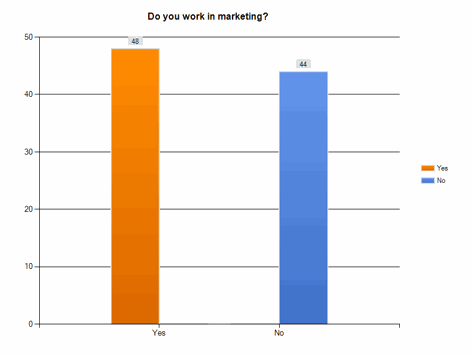
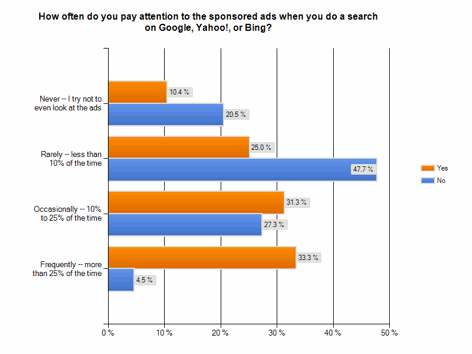
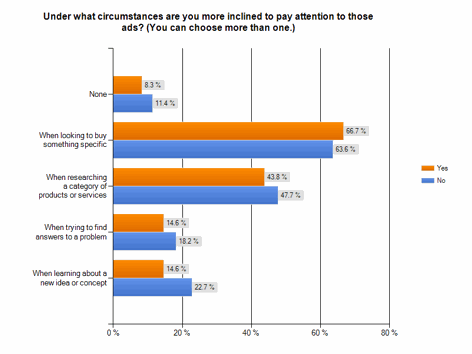
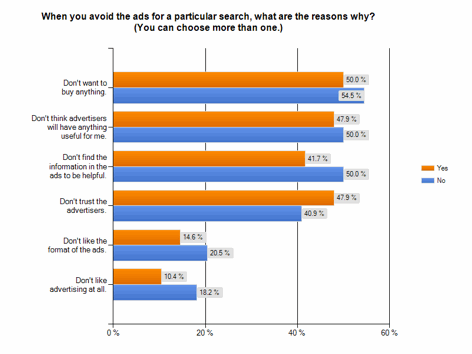
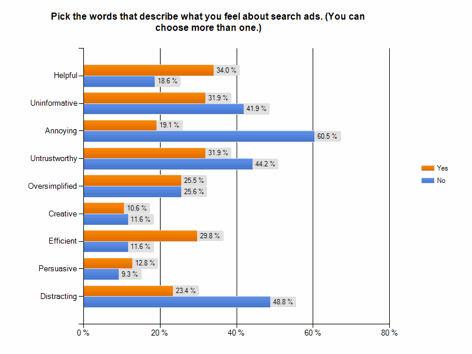

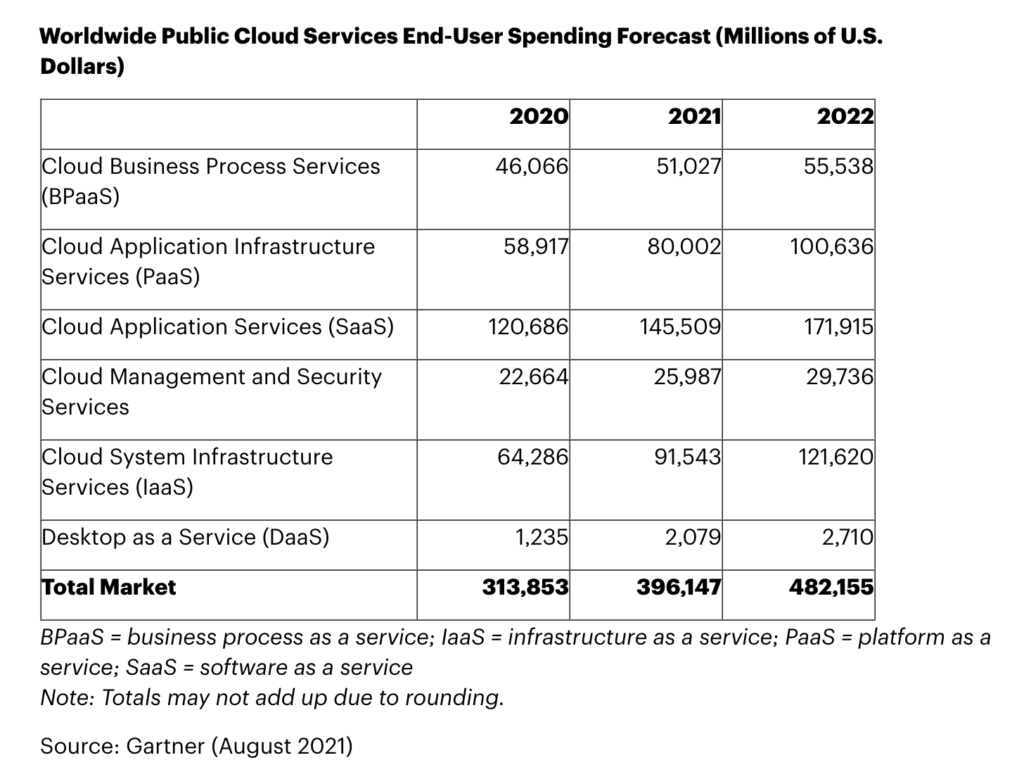

A drawback may be that a lot of people don’t know sponsored results from regular ones. So asking people whether they click on them or not might not give accurate feedback.
Good post.
Thanks, Rudd.
You bring up an interesting point. It is plausible that many of the people who click on the ads in Google don’t necessarily think of them as ads. Google has tried to walk a careful line with simultaneously delineating them and having them blend in with the look-and-feel of the overall page.
But this is where I start to get concerned. If advertising is relying on unsophisticated participants to deliver ROI — and major services such as Google are relying on advertising — then what happens as the population slowly but surely becomes more sophisticated?
I think Google’s original ambitions were to try to make advertising more useful to Internet users of all kinds. But that is clearly a high bar… and one that could probably use more attention in the industry.
Hi, Scott.
This is a great post — very insightful.
There are some jaw-dropping statistics here.
But there also is a big insight — that’s a positive but that needs to be understood and responded to by marketers: Search advertising is not really early-stage search … which means that it is unlikely to shape initial thoughts and instead is more likely to be engaged as late-stage serendipity in the buying process. This type of buyer-centric insight might completely change how some marketers design their search ads.
Interesting to think about.
Thanks for sharing your research with us.
Adam Needles
B2B Marketing Evangelist
Silverpop
Twitter: @abneedles
Blog: http://www.silverpop.com/blogs/demand-generation/
Thanks for the comment Adam (and also all the great tweets about this post!).
I think you’re right at the search advertising is failing to connect almost entirely in early-stage searches. While there are reasonable arguments for why that is the case, I’m doggedly against resigning search advertising to late-stage value between users and advertisers.
Particularly as the noise in organic and social media continues to rise in volume — a lot of good stuff, but a lot of not-so-good stuff mixed in — I hold out hope that search advertising will experience a Renaissance. In theory, it should be an excellent way for good advertisers to signal to the right buyers — and actually help them with their early-stage objectives.
But that will require different kinds of ads (and different kinds of corresponding post-click marketing). We’ve got some work ahead of us, but I think with a little ingenuity and boldness we can help make advertising more useful to users. Where “advertising” and “useful” probably have very broad possible interpretations.
This is a great post! I used to work at AT&T as a Search Engine Marketing Specialist. My job was to sell pay-per-click marketing to yellowpage advertisers. The hardest part was having to listen to the advertisers tell me that they “never” clicked on the sponsored results section because they didn’t trust them, or never looked there, or simply ignored them. This is a great study that is sad but true. I felt it every day at AT&T. Thanks again for the post!
I think with a little ingenuity and boldness we can help make advertising more useful to users. Where “advertising” and “useful” probably have very broad possible interpretations.